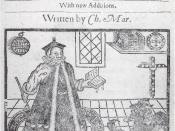Marlowe's Doctor Faustus explores the conflicting nature of ambition and true desire. Faustus would have us believe that his desire is to obtain omnipotence; he appears to be greatly ambitious, planning to become ÃÂgreat emperor of the worldÃÂ and threatening that the ÃÂEmperor shall not live but by me leaveÃÂ (1.3.103-5). However, once he actually obtains his powers, he entertains the Emperor rather than acting in accordance to his words. This suggests that FaustusÃÂ true aspiration is contrary to what is expressed in his words of ambition. He does not desire extraordinary things, but rather to simply live out the typical middle-class life. It is not truly his desire to rule over the world, but to merely live out his idea of Heaven on earth, as he believes he is fated for damnation.
Faustus is well aware that his time is limited on earth and that eternal life for mankind on earth is unattainable.
In FaustusÃÂ opening ruminations on philosophy and his profession, he concludes that AristotleÃÂs works, medicine, and even divinity can not eternize man. He decides he will not ÃÂlive and die in AristotleÃÂs worksÃÂ (1.1.5), nor will he pursue medicine for only if it ÃÂWouldst thou make men to live eternally / Or, being dead, raise them to life again, / Then this profession were to be esteemedÃÂ (1.1.24-6). Even when regarding divinity, he realizes that death is inevitable as he notes ÃÂThe reward of sin is deathÃÂ (1.140-41). Faustus seems to reason that none of these professions will be able to grant him a heavenly life on earth. The immortality he seeks in these professions also follows his belief that what awaits him at death is damnation; if he can not obtain eternal salvation, he might as well seek it on earth.
Faustus is searching for...


